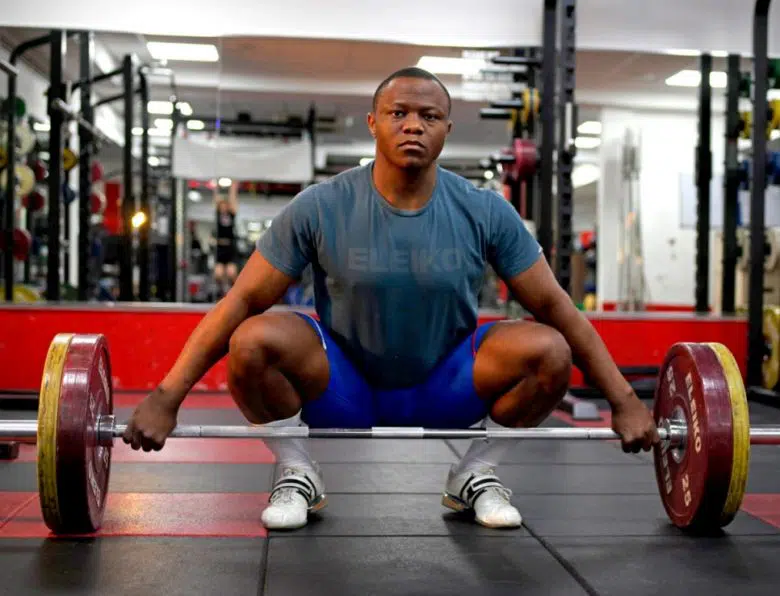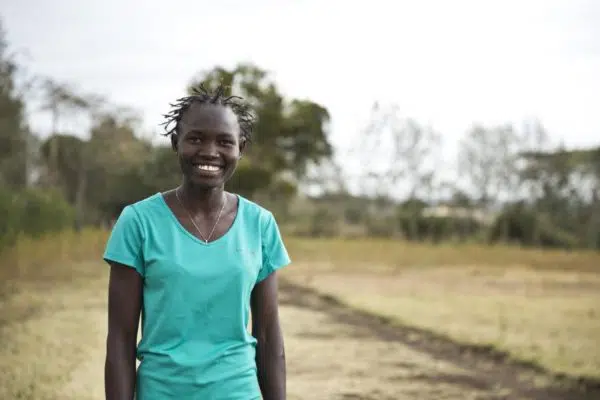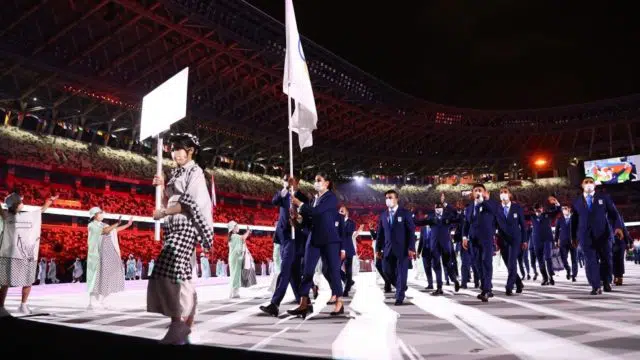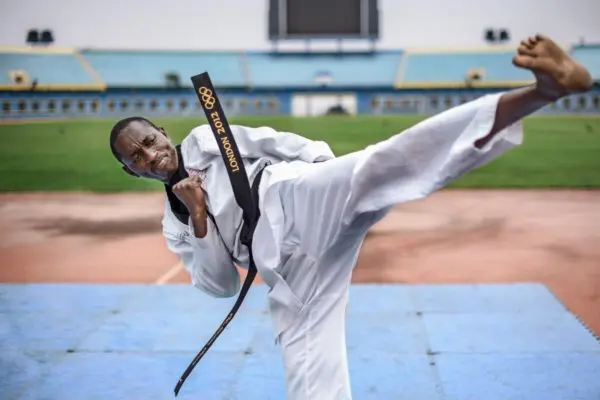
Refugee Olympic Team weightlifter Cyrille Tchatchet training in the Middlesex University gym in London, United Kingdom, in May 2019. © UNHCR/Béla Szandelszky
Having found help during tough times after arriving in the UK, Cyrille Tchatchet was inspired to study nursing alongside training to compete at the Tokyo Olympic Games.
From battling depression and homelessness to helping carry the Olympic flag into the Tokyo stadium for the Opening Ceremony, weightlifter and refugee athlete Cyrille Tchatchet has an inspiring story that he hopes will encourage more than 82 million displaced people around the world.
“I thought it was a dream!” he tweeted about his moment in the global spotlight last week, adding that he was proud to represent refugees as well as health workers, as he is now a mental health nurse in the UK.
Tchatchet, 25, is among the 29 members of the Refugee Olympic Team in Tokyo. His incredible journey reveals not only the power of sport to transform the lives of people who have fled home, but also the valuable contributions they can make to their new communities when given the chance.
In 2014, after competing in the Commonwealth Games in Glasgow, he left the athletes’ village, believing it was not safe for him to return to his home country.
Without any clear plans, he wound up in the southern coastal town of Brighton, where he spent about two months on the streets. The weather was cold, he struggled to find food and his spirits sank.
“I actually contemplated suicide.”
“I was 19 years old in a new city, being homeless, not having my mum or my dad there to look after me so I felt really, really low and depressed in Brighton,” he said in an interview with Eurosport. “I actually contemplated suicide.”
Seeing a hotline number for the Samaritans, a charity offering emotional support, Tchatchet gave them a call. A volunteer called a police car to pick him up, and at the police station he explained his situation and the process to seek asylum was begun.
Housed in Birmingham, Tchatchet anxiously waited for his asylum application to be approved, battling depression during this time as well. But weightlifting provided a vital emotional outlet and source of motivation, and he started entering British regional competitions.
After obtaining refugee status, he went on to set records and win British, English and British Universities & Colleges weightlifting titles in 2017, 2018 and 2019.
Wanting to give back to the community and inspired by the doctors and nurses who supported him during his darkest times, Tchatchet decided to study nursing and graduated with a first-class degree in Mental Health Nursing from Middlesex University.
He regularly trained at the university gym four or five times a week, but was able to balance that effectively with his studies, said one of his tutors, Lawrence Dadzie, senior lecturer in mental health at the university.
“I am a nurse by day and a weightlifter in the evening,” Tchatchat said in a January tweet. “I studied nursing to give back to the community that supported me. Hope will not only give you the courage to fight, but also promote your mental wellbeing.”
He was a focused and determined student, as well as a good listener — a vital quality for a mental health nurse, Dadzie said.
Tchatchet’s refugee background and his own struggles with depression have given him an empathy for patients, his tutor said. “He’s able to understand people who suffer from this condition, he’s able to understand them better. And he also feels that he can also give something back.”
Tchatchet did not broadcast his considerable sports achievements, Dadzie said. The university would put up posters of him around campus to celebrate his wins, but “unless you saw the pictures, you wouldn’t know it,” he said. “He wouldn’t talk too much about it.”
He started weightlifting when he was young after seeing a photograph of his cousin’s father lifting weights, and says it is more than a sport to him.
“My message to other refugees is to believe.”
“In weightlifting, you meet people and it becomes a social thing. It’s quite an addictive sport,” he said in an interview with Sky Sports. “It’s fun, it’s easy to measure your progress and achievements. Every day you go to the gym, you learn something, be it technique, be it a two kilograms improvement. There’s always room for improvement and improving your mental state and sense of achieving.”
In Tokyo, Tchatchet, who speaks French and English and confesses to having a sweet tooth, will be competing on Saturday in the 96kg division. His goal is to lift 190 kg in the snatch and 230 kg in the clean and jerk. His motto in life is, “Plan and work hard to achieve your objectives.”
Subscribe to UNHCR’s mailing list
Tchatchet says the Refugee Olympic Team is “… a team of hope.”
“My message to other refugees is to believe, to be hopeful,” he said. “Today might be difficult but the future might be brighter.”





